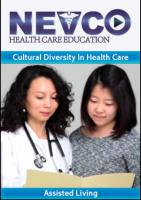Patient Cultural Awareness Tips for Healthcare Professionals
By Business Training Media
Cultural awareness is an essential skill for healthcare professionals to possess, as patients come from diverse cultural backgrounds with varying health beliefs, attitudes, and practices. It is important for healthcare professionals to understand these differences in order to provide culturally sensitive care that is respectful of patients' unique needs.
Failure to consider cultural differences in healthcare practices can result in misunderstandings, miscommunications, and negative health outcomes. Therefore, healthcare professionals should make a concerted effort to increase their cultural awareness and competence to provide effective healthcare services to patients from diverse backgrounds.
Here are some tips for healthcare professionals to increase their cultural awareness and provide quality care to patients from diverse cultures:
1. Recognize Your Biases:
One of the first steps toward cultural awareness is to recognize and acknowledge one's own biases. Healthcare professionals need to be aware of their own cultural beliefs and prejudices, which may affect their interactions with patients. Unconscious biases can result in stereotyping and assumptions about a patient's beliefs, behaviors, and health practices. It is essential to approach each patient with an open mind and without making assumptions based on their cultural background.
2. Educate Yourself:
Healthcare professionals should make an effort to educate themselves about different cultures and their healthcare practices. This can include reading literature on cultural diversity, attending cultural awareness training programs, or working with interpreters who can provide insights into patients' cultural backgrounds. It is essential to understand cultural differences in health beliefs, values, and practices to provide culturally sensitive care.
3. Build Rapport:
Building rapport with patients from diverse cultures is crucial to providing quality care. Healthcare professionals should make an effort to establish a good rapport with their patients by being respectful, empathetic, and attentive. This can include using appropriate body language, listening actively, and asking open-ended questions to better understand patients' needs.
4. Use Interpreters:
Using interpreters is essential when providing care to patients who speak a different language or come from a different culture. Healthcare professionals should use professional interpreters who are trained in medical interpretation and understand the cultural nuances of the patient's language. It is important to avoid using family members or friends as interpreters, as they may not be qualified and can introduce biases and miscommunications.
5. Be Culturally Sensitive:
Cultural sensitivity is essential when providing care to patients from diverse cultures. Healthcare professionals should be aware of cultural differences in health practices, such as dietary restrictions, religious beliefs, and attitudes toward healthcare. This can include asking patients about their cultural practices and beliefs and adapting care plans to accommodate these practices.
6. Respect Privacy and Modesty:
Many cultures place a high value on privacy and modesty, which can affect how patients interact with healthcare professionals. Healthcare professionals should be respectful of patients' privacy and modesty needs, such as by providing gowns or screens during examinations and avoiding unnecessary exposure.
7. Understand Healthcare Disparities:
Healthcare disparities exist in different cultures and can affect patients' access to healthcare services. Healthcare professionals should be aware of healthcare disparities and work to reduce them by providing culturally sensitive care and advocating for equal access to healthcare services.
Finally, cultural awareness is crucial for healthcare professionals to provide quality care to patients from diverse cultural backgrounds. By recognizing one's biases, educating oneself about different cultures, building rapport, using interpreters, being culturally sensitive, respecting privacy and modesty, and understanding healthcare disparities, healthcare professionals can provide culturally sensitive care that is respectful of patients' unique needs.
Business Training Media - Copyright 2023
Join Our Free HR Training Solutions eNewletter
Join our free HR Training Solutions eNewsletter today to stay up-to-date on the latest industry trends, training and development programs, best practices, and expert insights. Gain valuable knowledge, enhance your skills, improve your organization, build productive teams and elevate your career. Don't miss out on this invaluable resource – sign up now for our free HR Training Solutions eNewsletter!






